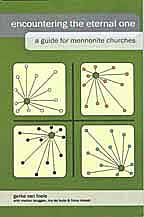Canadian Mennonite
Volume 11, No. 06
March 19, 2007

Catechism as confession and witness
 |
Encountering the Eternal One: A Guide for Mennonite Churches. Gerke van Hiele. Kitchener, Ont.: Pandora Press, 2006.
North American Mennonites have generally assumed that Christian catechism—study usually leading to baptism and church membership—is primarily a way to pass on the faith to children of the church. It assumes some basic familiarity with the biblical narrative and an acceptance of core Christian beliefs.
However, the catechism Encountering the Eternal One, recently published by the Mennonite Church in the Netherlands, focuses largely on adults who come into the church from other denominations or faith traditions. According to the preface of the Dutch edition, this book offers an apologetic for Christian belief that stems from the Mennonite tradition to people “who are from an entirely different tradition, with a different ideology—often members who only recently joined the church” (page 7).
Anabaptist scholar and publisher Arnold Snyder published an English version, believing that it may point the way to sharing faith in a society that is increasingly secular, a trend that the church in Europe had to face earlier than North America did, but which is fast becoming our reality.
How does one bear witness to faith in such a society? The title of the book itself indicates the approach of the author, who sometimes uses more generic “faith” language, rather than explicitly “religious” or even Christian language, as he attempts to build bridges of understanding to non-Christians or to Christians whose beliefs are tentative.
The book is an apologetic for Christian faith, but the author’s desire is to move the endeavour of catechism from monologue to dialogue. The book offers clear statements affirming what might be identifiable as core tenets of faith, but always casts these in the context that the reader may have doubts or may even be offended by the ideas expressed. Thus it is truly “apologetic” in the popular sense of the word.
At points, the style and content reflect a kind of Christian agnosticism: “What is left is an uncertain voice searching to express things that cannot really be given a name. We can only speak in images when we try to express the secrets of God” (page 103).
The book concludes with a Confession of Faith simply entitled “Credo.” The credo, which is dated, does not purport to express truth for all time; it simply expresses what its authors are prepared to hold—perhaps lightly—as truth at this time. In the credo, as in the book as a whole, the contributors consciously avoid declaring “truth” in a propositional way, but offer truths expressed as confession and witness.
The writers dance carefully around topics such as holding one another accountable. While being totally sensitive to the right of the individuals to hold their separate beliefs, they nonetheless gently but insistently suggest that there would be much to be gained by regaining a sense of church as community.
How might we receive this gift from the Dutch Mennonite Church? It could be used by pastors and other church leaders in catechism class, in Sunday school or other study groups. It is designed for use with young adults or adults, not children or youth.
Wiebe wins Taylor Prize
The 2007 Taylor Prize for Literary Non-fiction was awarded to Rudy Wiebe on Feb. 26 for his memoir Of This Earth: A Mennonite Boyhood in the Boreal Forest, published by Knopf Canada in 2006. The prize, which comes with $25,000, is open to books in the English language written by Canadians. The three-person jury considered 98 books and chose Of This Earth, declaring it to be “an evocative and moving memoir of his childhood in rural Saskatchewan,” using “prose that is both spare and eloquent.” Wiebe has also won two Governor-General’s Awards for English-language fiction: The Temptations of Big Bear in 1974 and A Discovery of Strangers in 1994. The other short-listed books for 2007 were Citizen of the World: The Life of Pierre Elliot Trudeau, Volume One: 1919-1968 by John English and The Judgment of Paris: The Revolutionary Decade that Gave the World Impressionism by Ross King.